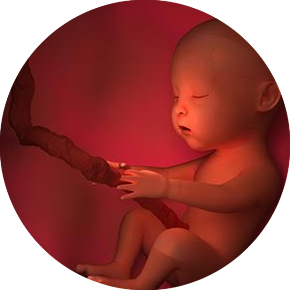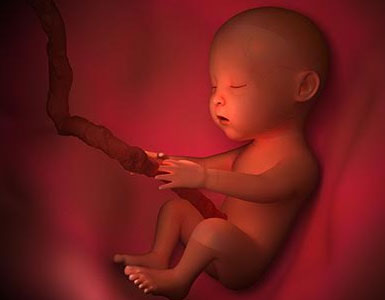Inside the womb

How does my baby breathe?
A growing baby needs oxygen beginning early in pregnancy. But a baby wouldn’t take his first
breath until after birth. This typically means that babies do not truly breathe inside the womb.
Instead, it is the umbilical cord that provides the baby with oxygen until his first breath.
Between 24-36 weeks of pregnancy, the lungs begin to develop tiny lung sacs that fill with
oxygen, called alveoli. Until the alveolus are fully developed, a baby may have difficulty
breathing on its own outside the womb.
You may worry about how your baby breathes, especially as he travels down the narrow
confines of the birth canal. It is the umbilical cord that continues to supply your baby with
oxygen until after he is born.
What can my baby see?
Vision is one of the last senses your baby develops, which helps explain why the baby’s
eyesight is fuzzy as a newborn. At birth, your baby can see about 8 to 12 inches in front of him.
As early as 18 th week, when the baby’s eyes are still closed, your baby's retinas can detect a
small amount of light filtering through if you're out in the beaming sun.
An unborn baby's eyelids remain closed until the mother is 28 weeks pregnant. This allows the
retinas to fully develop. After that time, the baby’s eyes open and even begin to blink.
By 33 rd week, your baby can start seeing dim shapes because by this time her pupils are able to
constrict and dilate.
Can my baby hear?
Whilst in the womb, your baby develops every single day. So in early pregnancy, sounds
wouldn’t be very clear and quite muffled.
However, as pregnancy progresses, your baby will be able to make out your heartbeat and
noises of your rumbling tummy. More excitingly, he will also begin to listen and react to sounds
outside the womb, including music and the sounds of his mommy and daddy.
Whilst your baby’s hearing will have developed enough for them to react to noises by
around the 27 th week, the amniotic fluid and your body will provide ample shielding from loud
noises.
What does my baby taste?
Even though your digestive system is separate from that of your baby’s, molecules of the food you
eat make their way into your amniotic fluid. It's not only minerals, vitamins, proteins and fats, but also
the molecules that give foods their unique taste.
The flavors your baby tastes inside the womb, though, won’t be quite as distinct and strong as they
are to you. That is because much of what you think of as the flavor of a food is actually its smell. This
smell is transmitted to your nose through the air. When in your womb, the baby only tastes molecules
from your bloodstream as he doesn’t have the sense of smell yet to amplify those flavors.
Why does my baby move?
Babies tend to move mostly in response to what’s happening in their environment. Too much
light, noise or even certain strong foods can stimulate your baby into kicking and moving.
Babies also need to stretch and move for relaxation.
Does my baby feel any pain?
The American Congress of Obstetricians and Gynecologists (ACOG) released a statement that
said an unborn baby cannot experience pain until it is viable outside the womb, which happens
around 24 weeks. Before this, a baby lacks the connections between the brain and nerves to
process the sensation of pain. Despite the conflicting arguments of whether babies feel pain in
the womb, your baby has plenty of protection from amniotic fluid.

